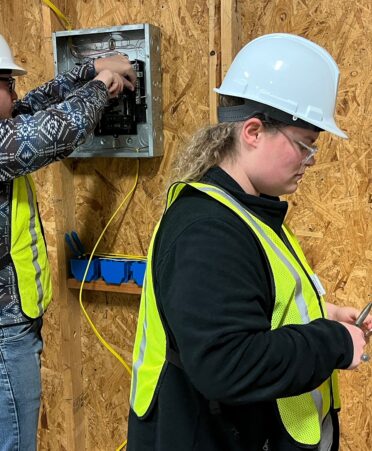(WACO, Texas) – Working with electricity can be a highly charged task.
“People need to understand how electricity and currents work,” said Andy Pustejovsky, an Electrical Construction instructor at Texas State Technical College’s Waco campus.
Some of the problems that people have with electricity include faulty outlets, outdated electrical setups and tripped breakers.
“I would not want anyone to touch anything if they do not know what they are doing,” said Lindsey Peters, of Belton, a TSTC Electrical Construction student who is also working on a degree in TSTC’s Solar Energy Technology.
According to the Centers for Disease Control and Prevention’s National Institute for Occupational Safety and Health, people who work with electricity are at risk for burns, electrocution and electric shock.
Pustejovsky said some people can be tempted to research on the internet for ways to fix electrical problems. He said they sometimes can get lucky and find the right video for the problem so that they can do repair work themselves.
However, Pustejovsky said an electrical contractor should be sought whenever simple fixes do not work.
“It’s not simply resetting — you have to dig into it,” he said.
The Texas Department of Licensing and Regulation manages the licensing for electricians in the state. The department is required by the Texas Electrical Safety and Licensing Act to adopt the most recent revisions of the National Electrical Code. The 2023 revision is the official electrical code used in the state.
Peters said an electrician needs to be personable to customers, listen to their issues and be knowledgeable.
Grayson Collins, a TSTC Electrical Construction student from Lorena, said electricians must pay attention to detail. He said wearing personal protective equipment is also important.
“I have learned a bunch and knew very little coming (into the program),” Collins said. “There is a lot more to it than people realize.”
Students complete the certificate of completion in Electrical Construction in three semesters. Some of the classes that they take include Basic Electrical Theory, Electrical Planning and Estimating, and National Electrical Code I. Students can work with an electrical contractor during their third semester to fulfill a cooperative education requirement for the certificate.
Students graduate from TSTC with hands-on experience in some of the electrical work they will do in the field.
“We hope to teach them enough to where they want to know what to do in their life,” Pustejovsky said.
The Electrical Construction program accepts students for the fall, spring and summer semesters.
For more information on TSTC, go to tstc.edu.
